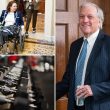It should come as no surprise that Alzheimer’s has touched the lives of two individuals designated by President-elect Donald Trump who will have much to say about America’s health care and how to pay for it for the disease has impacted countless families.
His choice to serve as the administrator of the Centers for Medicare and Medicaid Services (CMS), Dr. Mehmet Oz, has frequently referred to his mother’s Alzheimer’s disease and that experience has led him to be a very public and effective advocate for early detection.
Robert F. Kennedy Jr. would likely acknowledge that Sargent Shriver, who married into the Kennedy family, was diagnosed with Alzheimer’s disease in 2003. As Shriver’s family coped with the progressive nature of the disease, his daughter would later write a children’s book to help youngsters understand what may be happening to their grandparents.
At a time of significant change in how Washington approaches our nation’s health, there will soon come a point when almost every American will be compelled to designate someone in their family to care for a loved one diagnosed with Alzheimer’s disease. These two Trump appointees will be in unique positions to create programs that strengthen awareness, early detection, and research.
The actuarial tables are stark and implacable about the projected growth of Alzheimer’s. Currently, there are nearly seven million Americans living with the disease. By 2060, that number is projected to grow to nearly 14 million — doubling the current total — according to the Centers for Disease Control and Prevention.
The math underscores the arrival of what will be a health care crisis of unprecedented scope and incredible heartbreak. The inflection point will arrive as the number of Americans aged 65 and over will increase by 47% by 2050, from 58 million in 2022 to 82 million in the year 2050, according to current projections. The reality is, with age, comes the ever-increasing threat of dementia and Alzheimer’s.
Ongoing research seeks to unravel why the brain begins to destroy itself; but until a cure is found, those now being designated to chart our nation’s health care policies need to appreciate the looming challenge and chart a course of action.
Oz recognized the building crisis years ago and used his media platform to expand awareness and detection.
Oz is quoted as saying, “If the right word was, ‘You look beautiful today,’ (his mother) would use, ‘You look pretty prettier today.’ I missed those clues,” he said. “Alzheimer’s is like a snake in the grass. You don’t see it. You only see the effects of it, suddenly. And if there’s a wind blowing the grass, you don’t even notice the grass moving strangely. It sneaks up on you.”
His observation, “It sneaks up on you…” couldn’t be more telling.
The demand on caregivers is relentless and each day creates an unprecedented challenge as they encounter that “snake.”
One response is the creation of an education and resource center by the Alzheimer’s Foundation of America (AFA) that provides current and prospective caregivers with training, education, insight, and direction in how to navigate this journey. Housed on Long Island, it may well serve as a model for similar centers across the country as it will offer free, hourlong day programming in small groups. Those with Alzheimer’s will also be welcomed, offering music, art, pet, and dance therapies along with other options. The center will also serve to acclimate those with Alzheimer’s to real life scenarios, such as travel.
Other options leverage technology to assist the care giver. A new Alzheimer’s avatar, “Allison,” provides 24/7 assistance and can answer hundreds of questions relating to caregiving, dementia, brain health, and memory issues.
Developed by AFA to supplement the work of its Helpline team of social workers, caregivers can receive quick, detailed answers in an intuitive and interactive manner, without having to search through a multitude of webpages. Most importantly, it does not replace human interaction; “Allison” can connect users with a licensed social worker to address more in-depth, detailed, or personalized issues.
Alzheimer’s implications for the nation are real, significant, and enormous as it reaches tens of millions of Americans. From mounting home care expenses, to the ability of caregivers to attend to their own lives, to the role of federal and state governments in providing support, research, and direction, the growing impact of Alzheimer’s will be as profound as any other health care crisis faced by our nation.
For those who doubt its impact, one only needs to follow the families of the two individuals nominated to guide America’s health care needs after Jan. 20, 2025.
Fuschillo is president & CEO of the Alzheimer’s Foundation of America.








